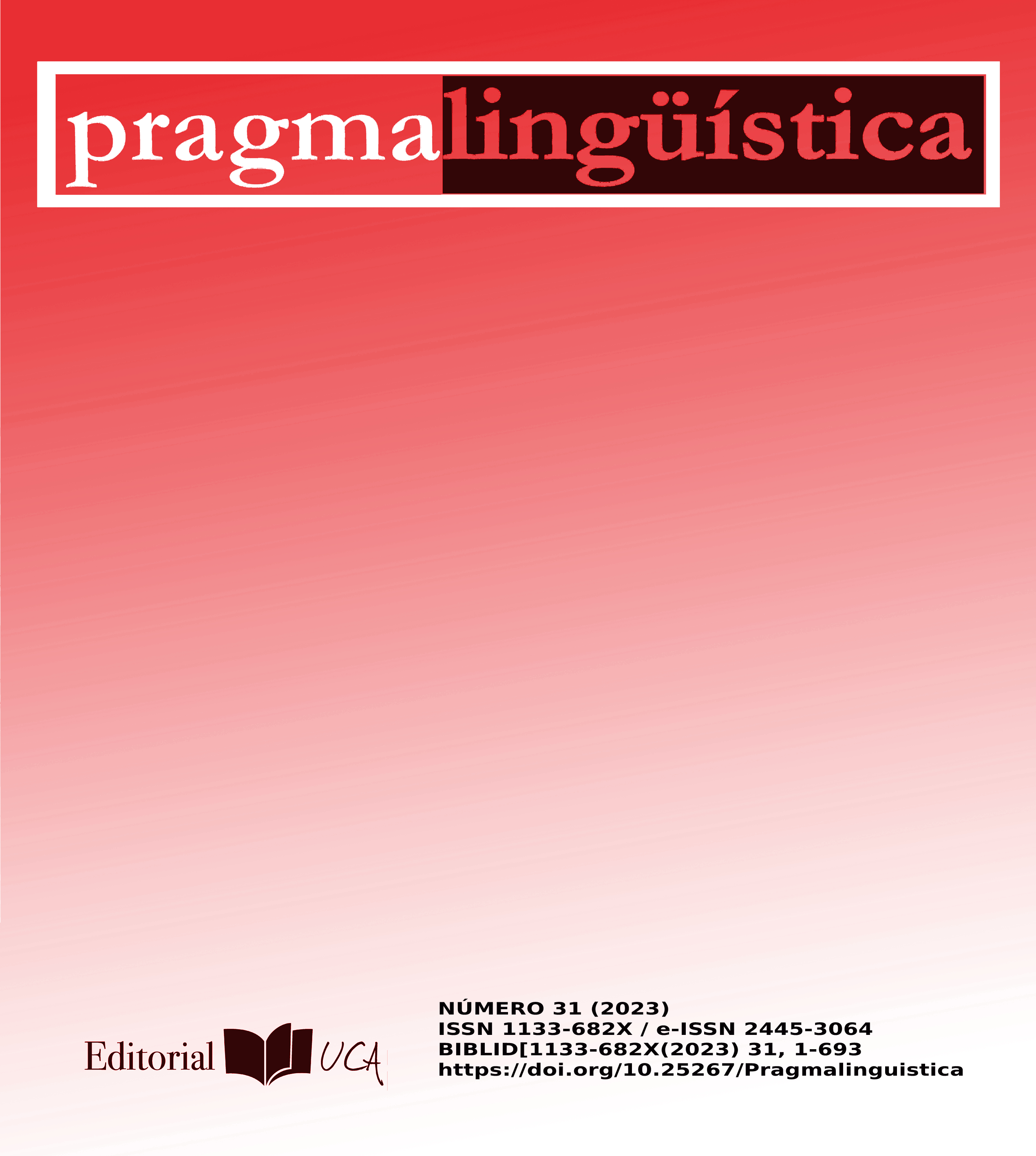Reproach as a core value: the analysis of the communicative potential of the routine formulae 'qué broma es esta' and 'de qué vas'

DOI
https://doi.org/10.25267/Pragmalinguistica.2023.i31.24Info
Abstract
Despite the fact that routine formulae are idiomatic expressions “whose occurrence is closely bound to specific social situations” (Coulmas, 1979: 240), there is a scarcity of studies analysing Spanish phraseologisms from a pragmalinguistic perspective, let alone within the framework of Speech Act Theory. For this reason, we believe that lexicographic information on their functions is incomplete and lacking in precision. Therefore, this paper aims to explore the communicative potential of two routine formulae —qué broma es esta and de qué vas— and to establish the boundaries between three possible Face Threatening Acts (FTA) that these formulae may convey. To do so, we analysed 141 examples extracted from the corpus esTenTen18, among other methods, by examining the illocutionary force of the acts performed when these expressions are used. The results show that both expressions primarily convey reproach, in contrast to the information provided in various Spanish dictionaries.
Keywords
Downloads
How to Cite
License
Copyright (c) 2023 Bojana Tulimirović

This work is licensed under a Creative Commons Attribution-NonCommercial-NoDerivatives 4.0 International License.
References
AHMADIAN, M. J. & ESLAMI-RASEKH, A. (2011): “A comparative study of reprimand strategies: evidence from Iranian and American speech communities”, The Social Science, 6(1), pp. 1-7.
ALVARADO ORTEGA, M.ª B. (2010): Las fórmulas rutinarias del español: teoría y aplicaciones, Frankfurt am Main: Peter Lang.
AMIGOT CASTILLO, L. (2014): Las fórmulas rutinarias expresivas del alemán y del español, Madrid: Universidad Complutense de Madrid.
AUSTIN, J. L. (1975 [1962]): How to do things with words, Oxford: Clarendon Press.
BOXER, D. (1993): “Social distance and speech behavior: The case of indirect complaints”, Journal of Pragmatics, 19, pp. 103-125. https://doi.org/10.1016/0378-2166(93)90084-3
BROWN, P. & LEVINSON, S. (1987): Politeness. Some universals in language usage, Cambridge: Cambridge University Press.
BUITRAGO, A. (2007): Diccionario de dichos y frases hechas, Madrid: Espasa.
CANTERA ORTIZ DE URBINA, J. (2011): Diccionario de dichos y expresiones del español. Su interpretación al alcance de todos, Madrid: Abada Editores.
CORPAS PASTOR, G. (1996): Manual de fraseología española, Madrid: Gredos.
COULMAS, F. (1979): “On the sociolinguistic relevance of routine formulae”, Journal of Pragmatics, 3, pp. 239-266.
DECOCK, S. & DEPRAETERE, I. (2018): “(In)directness and complaints: a reassessment”, Journal of Pragmatics, 132, pp. 33-46. https://doi.org/10.1016/j.pragma.2018.04.010
DEVECI, T. (2015): “The Complaint Speech Act Set Produced by University Student Speaking English as a Foreign Language”, LICEJ, 4(1), pp. 2161-2171. https://doi.org/10.20533/licej.2040.2589.2015.0287
GARCÍA, C. (1996): “Reprimanding and responding to a reprimand: a case study of Peruvian Spanish speakers”, Journal of Pragmatics, 26, pp. 663-697. https://doi.org/10.1016/0378-2166(95)00061-5
GRICE, H. P. (1975): “Logic and conversation”, Cole, P. & Morgan, J. L. (eds.), Syntax and Semantics, Speech acts, vol. 3, New York: Academic Press, pp. 41-58.
GÜNTER, S. (1996): “The prosodic contextualization of moral work: an analysis of reproaches in ‘why’-formats”, Couper-Kuhlen, E. & Selting, M. (eds.), Prosody in conversation: Interactional studies, Cambridge: Cambridge University Press, pp. 271-302.
HAVERKATE, H. (1993): “Acerca de los actos de habla expresivos y comisivos en español”, Diálogos hispánicos, 12, pp. 149-180.
LAROUSSE (2001): Gran Diccionario de Frases Hechas, Barcelona: SPES Editorial.
LEECH, G. (1983): Principles of Pragmatics, London: Longman.
MARGUTTI, P. (2011): “Teachers’ reproaches and managing discipline in the classroom: when teachers tell students what they do ‘wrong’”, Linguistics and Education, 22, pp. 310-329. https://doi.org/10.1016/j.linged.2011.02.015
MARTÍN SÁNCHEZ, M. (1997): Diccionario del español coloquial (Dichos, modismos y locuciones populares), Madrid: Tellus.
NÚÑEZ BAYO, Z. (2016): Las fórmulas oracionales en el español coloquial, Alcalá de Henares: Universidad de Alcalá.
OLSHTAIN, E. & DEINBACH, L. (1993): “Interlanguage features of the speech act of complaining”, Kasper, G. & Blum-Kulka, Sh. (eds.), Interlanguage Pragmatics, Oxford: Oxford University Press, pp. 108-122.
REAL ACADEMIA ESPAÑOLA (2014): Diccionario de la lengua española, Madrid: RAE.
SEARLE, J. R. (2001 [1969]): Actos de habla, Madrid: Cátedra.
SEARLE, J. R. (1975): “Indirect speech acts”, Cole, P. & Morgan, J. L. (eds.), Syntax and Semantics, Speech acts, San Diego: Academic Press, pp. 59-82.
SEARLE, J. R. (1976): “A classification of illocutionary acts”, Language in Society, 5, pp. 1-23. https://doi.org/10.1017/S0047404500006837
SEARLE, J. R. (1979): Expression and meaning. Studies in the Theory of Speech Acts, Cambridge: Cambridge University Press.
SEARLE, J. R. & VANDERVEKEN, D. (1985): Foundations of illocutionary logic, Cambridge: Cambridge University Press.
SECO, M., ANDRÉS, O. & RAMOS, G. (2009 [2004]): Diccionario Fraseológico Documentado del Español Actual. Locuciones y modismos españoles, Madrid: Aguilar Lexicografía.
SOLÍS CASCO, I. M. ª (2006): “La pragmática en el aula de ELE: los actos de habla indirectos”, Actas del XVI Congreso Internacional de la ASELE: La Competencia Pragmática o la Enseñanza del Español como Lengua Extranjera, Oviedo: Servicio de Publicaciones de la Universidad de Oviedo, pp. 607-615.
TOLEDO AZÓCAR, S. (2016): El acto queja: estrategias pragmáticas empleadas por hablantes nativos del español de Chile y hablantes no nativos, aprendientes del español, Valladolid: Universidad de Valladolid.
TULIMIROVIĆ, B. (2021): Las fórmulas fraseológicas de reproche en español, Granada: Universidad de Granada.
VALLEJO ZAPATA, V. J. (2021): Caracterización de la fuerza ilocucionaria múltiple en el marco de la teoría de los actos de habla, Medellín: Universidad de Antioquia.
VANDERVEKEN, D. (1990): Meaning and Speech Acts: Principles of Language Use, Cambridge: Cambridge University Press.
VAN EEMEREN, F. & GROOTENDORST, R. (2004): A Systematic Theory of Argumentation: The Pragma-dialectical Approach, Cambridge: Cambridge University Press.
VARELA, F. & KUBARTH, H. (2004 [1996]): Diccionario Fraseológico del Español Moderno, Madrid: Gredos.
WOTJAK, B. (2005): “Fórmulas rutinarias en los diccionarios didácticos”, Luque Durán, J. y Pamies Bertrán, A. (eds.), La creatividad en el lenguaje: colocaciones idiomáticas y fraseología, Granada: Método Ediciones, pp. 331-349.






